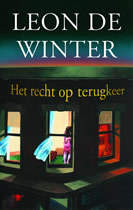Leon de Winter
The Right of Return (Het recht op terugkeer)
Clever, beautiful, nightmarish
In The Right of Return Leon de Winter has written an audacious book that demonstrates more powerfully than ever that he is a prophet of doom. In this science-fiction novel, set mainly in 2024 and 2025, he describes a doom scenario in which Israel has been reduced in size and beleaguered to such an extent that it is virtually uninhabitable.
Bram Mannheim runs an office in Tel Aviv that helps parents track down lost children. His own son disappeared sixteen years previously. In his free time he works as a volunteer for the ambulance service. After a bloody attack on a border post, Bram makes a discovery that puts him on the trail of a sinister plot, in which his son may have been involved.
‘Solidarity,’ De Winter’s central character sighs, ‘grew out of the fate he shared with them (his students, his colleagues, his father) and the great abstraction that this country was. He could not free himself from it, even if he wanted to.’ De Winter is a writer with a mission. If he can no longer save the world through his columns and polemical articles, then surely he can with his novels. In The Right of Return he leaves no room for doubt that unless the Jews root out the Palestinians, the reverse will happen. In fact, Muslims will gain the upper hand in any case, wherever they are in the world. This fear of Muslims is expressed not by De Winter’s protagonist Bram Mannheim but by Bram’s father, his employer and his fellow employees, so that it seems some slight opening remains.
Writers with an all too urgent message usually write poorly. In that sense De Winter is an exception. With The Right of Return he continues in the vein that made his novel God’s Gym (2002) such an achievement: a pared down kind of literature, far removed from the Dutch literary tradition, emulating the American ‘hard-boiled’ thriller. It is a genre that leaves little room for ambiguity and enigma, instead taking a direct path to its terrible denouement. Clever. Beautiful. Nightmarish. You want to read all about it, without delay, to be convinced of an acrimoniously composed world view: where the synagogue disappears, the mosque will arise.
Publisher
De Bezige Bij
Van Miereveldstraat 1
NL - 1071 DW Amsterdam
TEL. +31 20 305 98 10
FAX +31 20 305 98 24
E-mail: [email protected]
Website: www.debezigebij.nl
Rights
Diogenes
E-mail: [email protected]
Website: www.diogenes.ch
Publishing details
Het recht op terugkeer (2008, 458 pp)

Biography
Leon de Winter (b. 1954) became known in the early 1980s with subdued, intellectual novels like Zoeken naar Eileen W (Looking for Eileen W.) and La Place de la Bastille, but he later concentrated on creating vehicles for his most important themes – Jewish identity after the Second World War, good and evil – in what he refers to as ‘good reads.’ Kaplan (1986), SuperTex (1991), Zionoco (1995) and God’s Gym (2002) each became bestsellers. De Winter invariably writes about a man in a crisis, searching for his (Jewish) roots and being forced to make existential choices. His cinematic style reflects the fact that De Winter is also a film maker. Het recht op terugkeer (The Right of Return, 2008) has been nominated for both the AKO Literature Prize and the NS Public’s Choice Prize.
Website: www.leondewinter.nl
Quotes
“A pitiless pageturner.”
― De Pers
“Unbearably exciting”
― Vrij Nederland
“A sensational comeback”
― De Morgen
“A bold novel with Mulisch-like allure”
― De Volkskrant
Category
Genre: fiction
Translations
- Das Recht auf Rückkehr. Zürich: Diogenes, 2009
- Il diritto al ritorno. Milano: Marcos y Marcos, 2011
- Právo na návrat. Praha: Odeon, 2010
- Continued...
Rights sold
- Turbine (Århus, Denemarken)
- Continued...
